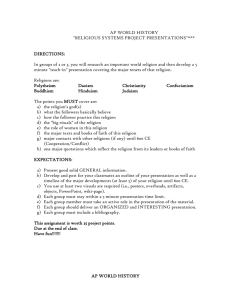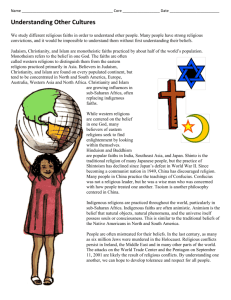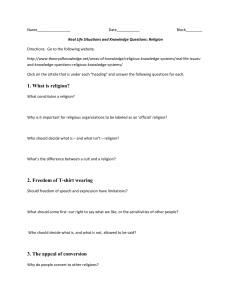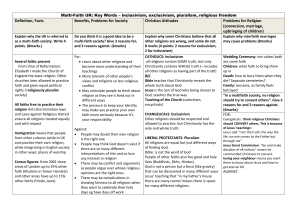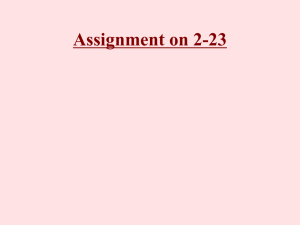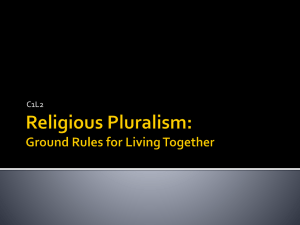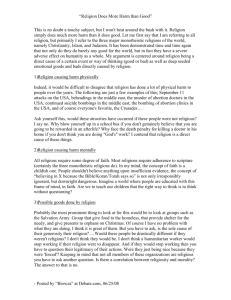HIST 115 World Religions Syllabus UAAC 2014 10 28
advertisement
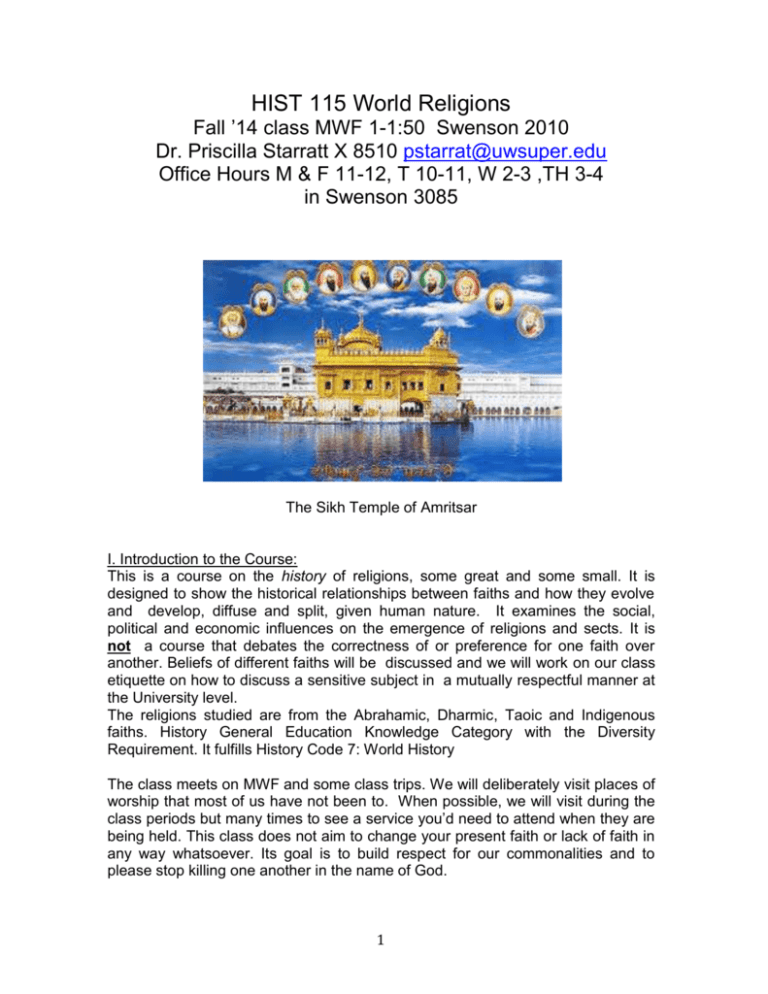
HIST 115 World Religions Fall ’14 class MWF 1-1:50 Swenson 2010 Dr. Priscilla Starratt X 8510 pstarrat@uwsuper.edu Office Hours M & F 11-12, T 10-11, W 2-3 ,TH 3-4 in Swenson 3085 The Sikh Temple of Amritsar I. Introduction to the Course: This is a course on the history of religions, some great and some small. It is designed to show the historical relationships between faiths and how they evolve and develop, diffuse and split, given human nature. It examines the social, political and economic influences on the emergence of religions and sects. It is not a course that debates the correctness of or preference for one faith over another. Beliefs of different faiths will be discussed and we will work on our class etiquette on how to discuss a sensitive subject in a mutually respectful manner at the University level. The religions studied are from the Abrahamic, Dharmic, Taoic and Indigenous faiths. History General Education Knowledge Category with the Diversity Requirement. It fulfills History Code 7: World History The class meets on MWF and some class trips. We will deliberately visit places of worship that most of us have not been to. When possible, we will visit during the class periods but many times to see a service you’d need to attend when they are being held. This class does not aim to change your present faith or lack of faith in any way whatsoever. Its goal is to build respect for our commonalities and to please stop killing one another in the name of God. 1 II. Catalog Description: HIST 115 History of World Religions An introduction to the history of religions and how they are related with examples from Abrahamic, Dharmic, Taoist and indigenous religions. Includes visits and films. Code 7 III. Addressing Learning Goals: Students are asked to look at the following learning goals being pursued during this course and realize that their learning may be assessed in many ways as a result. Some of the assessments may have no affect on your grade in this class; they aim at the affect on your life, to see if you are actually accomplishing the goals of the course. Symbol of the Native American Church General Education Learning Goals Particularly: Diversity and Global Citizenship Students demonstrate empathetic and ethical thinking based on knowledge of geographical, gender, environmental, cultural, racial, and religious factors. The last topic leads us to apply for Gen Ed Diversity credit for this course on the grounds that: A course will be considered to meet the diversity requirement if it focuses on knowledge of the diversity of human experience including geographic, gender, sexual identity, environmental, cultural, abilities, class, economic, racial or religious factors. History goals Most particularly 10. An understanding of how social categories such as race, class, gender, ethnicity, and religion are constructed and the impact of these categories on people’s lived experience. 2 Religious Symbol of Tenrikyo, a world religion of Japanese origin IV. University Policies: a. Weather Policy: In case of bad weather call the UWS weather hot line for information about cancellations . It is (715) 394-8400. b. accommodation of religious belief: Please notify the instructor at the beginning of the semester if there are special dates that need accommodation due to your sincerely held religious beliefs. Points lost by absence for observance of religious ceremonies, obligations, and holidays may be made up. Tests and assignments may be made up or replaced. c. Classes or work missed for university related co-curricular activities, such as sports teams, Mock-Trial, Model UN, class trips, may be made up. ( NB this says made up, not excused) Please have the sponsoring organization notify your instructor of the event, preferably before your absence. d. Accommodations needed due to a medical condition, like pregnancy, chronic illness, learning disability or challenge, need to be documented with Student Services. Otherwise no accommodation can be made. Please call (715) 3948019 or contact a staff member in the Student Support Services Office using http://www.uwsuper.edu/support/forms/contactus.cfm Non-traditional and Veterans have their own support service office: http://www.uwsuper.edu/vnsc/forms/contactus.cfm For a longer and more detailed description of a variety of university policies please go to: http://www.uwsuper.edu/deanfaculties/forms/upload/Revised-12-1813-Syllabus-Attachment-for-2014-2015.pdf e. Plagiarism is the submission of work that is not your own. It may be another student’s, from a published work or a web site. All borrowed materials must be 3 properly documented or you run the risk of failing the assignment. Repeated plagiarism may result in failure of the class. for more information you may like to consult: . Academic misconduct details: http://docs.legis.wisconsin.gov/code/admin_code/uws/14.pdf V Course Policies: a. Attendance: Attendance at UWS classes is both required and expected. Because this is a class on which few students have prior expertise, as an incentive to attend regularly, your attendance is taken daily and with class participation counts 10% of your grade. Because we will practice cooperative learning, you need to be there to contribute to the class. UWS faculty, however, recognize that there are cases of personal illness, bad weather, sports participation, illness of a family member or other civic or religious responsibilities that can prevent any serious student from attending class now and then. You have 3 excused absences: use them carefully. This is so you do not worry over an absence or two. You can miss another week of classes and still get an A- in attendance. But recognize poor attendance will let your group members down and hurt your grade. You MUST attend 2/3rds of the classes to be considered eligible to pass this class. If you find that this will be impossible for you, please drop the course one day before the last day to drop. Even if you are not fully prepared, come to class because you will always gain something from coming to class in a subject like this: a visual image, a concept, a hint about how to do well on a paper or an exam. So keep this in mind: “Eighty percent of success is showing up.” Woody Allen actor, film director, comedian, musician, writer. 1935The grade for attendance will be: Missing 0-3 classes 100% Missing 4-6 classes 97%, 95% and 92% Missing 7-9 classes 87%, 85% and 82% Missing 10-12 classes 77%, 75% and 72% Missing 13-15 classes 67%, 65% and 62%, If you find you will miss more than 15 classes, please consider taking the class again and drop it before you are failed. There are only 43 classes total. Missing more than 15 would be more than 1/3 of the classes. Exceptions to this policy will be based on truly exceptional circumstances like military service, childbirth etc. If you miss a class for a religious holiday or ceremony or a university sponsored event and think this will harm your attendance grade, see me for how to make up the work. But most students who keep their absences down to the minimum will not be harmed by missing a class or two now and then. If you miss a class, do not write to ask me what you missed. Contact your allies in the study group to which you belong. You may review films in SWEN 3053, the student resource room if they are not on line. 4 COST: Finally, think of the cost of missing a class in HIST 115: In addition to getting behind on class concepts and not making progress there is a financial cost to missing class: This class meets three times a week. If you are taking 4 classes and paying WI in-state tuition you throw away $22.07 every time you miss a class. If you are taking 5 classes, it’s $17.66 you’ve wasted. Think about it. Money you earned, parents earned, you borrowed and have to pay back?? If you miss 5 classes you have blown over $100.00!! b. Class Trips: There is a class requirement to go on at least two class trips, one in Superior-Duluth and hopefully one in the Twin Cities. The trips will be on the day of worship of the faith visited. We will work out the dates of this during the early part of the term. We may split up into groups and pursue different class trips, depending on class size and transportation issues. If you can not go with the group due to work or other conflicting university activity, an alternative may be found for you. Most faculty will let you make up an absence for a class trip. c. Class Etiquette: Most places will not allow you to discuss religion, politics, race, sex, war and violence in public, at work, or in public transportation for fear of law suits and provoking disagreements or even fights. This is a university. We can discuss any topic. The issue is HOW. Recognizing the controversial nature of the class, and the controversial nature of the issue of religious diversity, we must be extra courteous and extra careful not to offend others in our discussions. To be able to discuss these topics in a class of 15 students is a privilege and we must keep the atmosphere unheated and open. Please treat our class atmosphere with care and nurture our ability to discuss freely and openly. We must respect everyone’s faith and every faith we study as people have chosen those ways to worship or communicate with God or the Life Force, or the Great Spirit, and consider them sacred. VI. Methods of Assessment Attendance 10% 2 oral reports for Jewish , Muslim and Christian sects, and Hindu gods and goddesses 5% each =10% 2 class trip reports: what you saw and what you learned10% each =20% 2 pages ea. One on what you saw and one on what you learned. 2 Book & Film reports on Act of Faith: the Story of An American Muslim and the film “Arranged” and book report on Under the Lemon Trees with the film Bend it Like Beckham 10% each with the study guides=20% turn in 4 essays: My own religious exposure and education. What I learned and what surprised me about Abrahamic, Dharmic, and Daoic and Indigenous faiths with completed study charts. 10% each or 40% 5 Mevlevi Sufis turn in Konya, Turkey. Muslim Mystics VI. Educational Expectations of University Students: You will put into each 3 credit course 135 hours of work: 3 in the class each week and 6 outside of class for 9 hours of class X 15 Weeks of the term plus the examination period of 2 hours You will buy, rent, or borrow the text books for the course. You will bring your text books to class when they are being discussed. Reading academic work is a university expectation. You have left public high school. The government is no longer responsible to provide your books. You want a college degree? … it has costs. You will come to class prepared, with the reading and assignments for that class completed. To discuss course material in a group is a university expectation. You will see fewer class hours and more individual responsibilities for your learning than in high school. You are expected to teach yourself, to organize your thinking and learning and information and to share your research and learning with others. You have class responsibilities to help your classmates learn as this is an oncampus class. You will come to all classes unless you are ill with something that would endanger your health or the health or others, unless your child or parent or partner is sick, needs you to take them to a doctor or the dog needs to go to the vet. Lateness to class and early to leave? Please come to class anyway even if you’re late or have to leave early. With responsibilities of jobs and children students can’t always be on time. If you must leave early, please say excuse me and leave as silently as possible. Please do not pack up your loads before the end of class. If you can, let me know why you are arriving late or leaving early as a courtesy and so I don’t think I’ve offended you. You are mindful that you are setting out to become a professional and are keen to acquire the skills of organization, comportment, patience, respect for others, attention to detail, thoroughness of work, habits of mind, written and oral communication skills and appreciation of the big picture required of professionals. You understand that university education is entering an elite world. Only about 25 % of Americans have a university bachelor’s degree. You want to be a leader 6 in your field and will work on the expertise and communication skills, multi-cultural and global awareness needed to take up a professional position. Weekly assignments will require you to read, to write, to present and to discuss. Your participation is important not only to your own development but also to others. A university classroom is a group learning environment. You need to attend and you need to participate. VII. Textbooks There are four books for the class. Please arrange to buy or share them so that you can have access and read them in a timely fashion. 1. 2010. Oliver, Paul. Teach Yourself World Faiths. Blacklick, OH: McGraw Hill. 978-1-444-10513-1 Excellent historical background to 12 major faiths. 2. 2010 Patel,Eboo Act of Faith the Story of An American Muslim in the Struggle for the Soul of a Generation. Boston: Beacon Press. How do you grow up in the US scene when you are Muslim and trying to fit in? What do you do to address being bullied? 3. 2009. Backhaus, Bhira. Under the Lemon Tree .Thomas Dunne Books. 0312379536 What’s it like to be a Sikh immigrant in CA?? A multi-generational with both male and female points of view. 4. 2000. Fawcett, Melissa Jayne. Medicine Trail: The Life and Lessons of Gladys Tantaquidgeon Tuscon: Univ of Arizona Press. 0-8165-2069-0 Gladys Tantaquidgeon used her position as an anthropologist’s assistant to do her own comparative study on First Nations’ religions and ceremonies. Her story is told by her granddaughter. VIII. Schedule of Learning Activities: Sept 3rd Week 1 Introduce the course, students, text and teacher. course Etiquette Please! Sharing our religious backgrounds, exposures, and educational experiences. Homework: write 2 pages on what religions you have been exposed to growing up. A passing glance or full emersion?? Classroom survey will total the numbers but retain anonymity. Due Monday 9/8 PART I Religions of the western monothesistic tradition: 7 Sept 8th Week 2 Zoroastrianism: A Basis for the western monotheistic faiths? Read Oliver Chapter 12 p. 167-175 Begin to read Patel p.1-80 and do study guide for homework due Wed. September 15th Week 3 Judaism history, varieties, types, the Holocaust, and Israel read Oliver 55-74 Types of Judaism: oral reports Friday 9/19 talk 5 minutes and photograph. Read Patel p. 81-140 do the study guide for class on Wednesday the 17th September 22 Week 4 Christianity history and developments, old and new. Read Oliver p. 75-93 Sept 25th Buddhist talk at noon Oral reports on movements like Moravians, Brethren, Quaker, Mormon, Unitarian, Orthodox, Jehovah Witness, Seventh Day Adventist, Amish, Mennonite and others…Talk 5 minutes and bring a photograph September 29 week 5 Local visits and reports on Orthodox Churches, Mormons, Quaker and Unitarian Meeting Houses and Mosque. Synagogue goers will need to go earlier due to the Jewish holidays. 2 Buddhist groups. Write 2 pages on What I saw and what I learned from this visit. Watch the movie about Orthodox Jews and Muslims in the USA Arranged. Bring your friends. Monday the 29th & Wednesday the 1st of October Read Patel 141-192 for discussion Wed next week the 8th and 10th October 6th Week 6 Islam, Ahmadiyya, Nation of Islam Oliver 94-114 Turn in your book & film report: After reading Act of Faith, and watching the movie Arranged, what have you learned about the challenges of growing up Muslim in the USA? Due in class Monday October 13th October 13th Week 7 Baha’i faith Read Oliver 115-121 working on Essay #2 is due What did you learn and what surprised you about the Abrahamic faith: 4 pages and study guides. Due October 20th PART II Dharmic Religions of Indian Inspiration and Origin October 20 Week 8 from Hinduism to Brahma Kumari Read Oliver 122-138, & 198 Oral reports on Hindu gods and goddesses with illustrations on the 24th October 27th Week 9 Buddhism Read Oliver 139-156, Read Backhaus to p.142 work on the study guide November 3rd Week 10 Jainism Read Oliver 157-166, Read Backhaus to page 237 work on the study guide November 10th Week 11 Sikhism Read Oliver 176-190, Watch Bend it Like Beckham bring your friends 8 Write your essay on what you learned about the history of Dharmic faiths and what surprised you. 4 pages with 2 charts PART III Daoic Religions of East Asia November 17th Week 12 Confucianism Read Oliver 27-36 Finish Backhaus to p. 341 Write over the weekend: After reading Under the Lemon Trees and watching Bend it Like Beckham, I learned something about what it’s like to grow up Sikh in the west. Namely: 2 pages. Due Monday November 24th November 24. Week 13 Taoism Read Oliver 37-46, Read Fawcett to p. 74 and do the study guide December 1st Some Indigenous Faiths Yoruba faith in Africa and the Diaspora at the D2L site Read Chapter 6 Yoruba Religion in God is NOT One by Stephen Prothero December 8th Week 15 Shintoism Read Oliver 47-53 Read Fawcett to the end p. 171 finish the study guide do course evaluation December 16 Final Exam Week Final Exam which is to bring essay #3 on what you learned about Daoic and Indigenous faiths. 4 pages with 2 study charts and the study guide on Fawcett’s Medicine Trails to office 3085 during or before the exam period of Friday December 19, 2014 9

